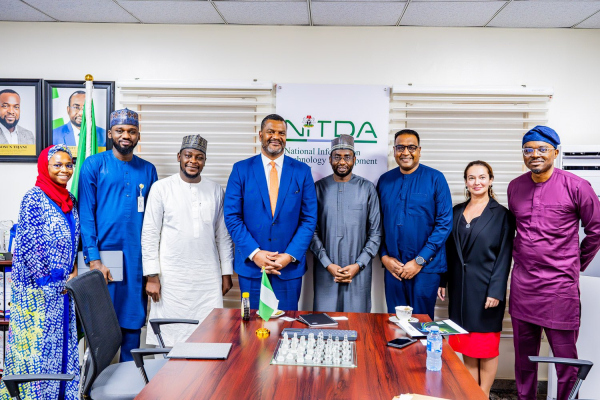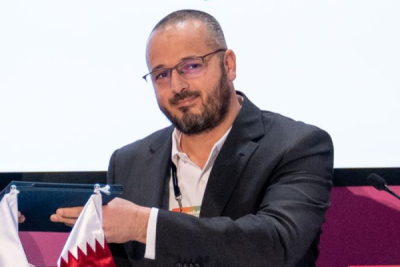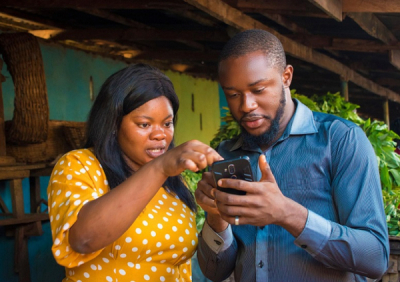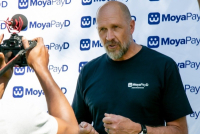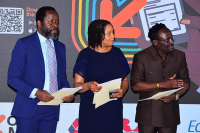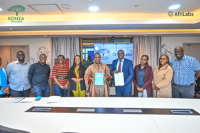Charles Oligbo, a Nigerian fintech entrepreneur based in the United States, rethinks how banks connect with their customers through digital innovation. He founded and leads Sawport Inc, a company that modernizes banking by creating virtual branches powered by artificial intelligence.
Since its launch in 2021, Sawport developed a platform that replicates physical bank interactions online. The “Virtual Branch” environment allows customers to communicate with advisors in real time via videoconference, eliminating the need for traditional phone calls or emails.
The platform integrates multiple features, including audio and video calls, instant messaging, appointment scheduling, automatic call-back, identity verification, facial recognition, electronic signatures, omnichannel management, real-time translation, and automated multilingual support.
In addition to running Sawport, Oligbo serves on the executive committee of the North American Fintech Coalition. This group supports credit unions and community banks across the US and Canada, advancing technology adoption.
Oligbo holds a bachelor’s degree in computer and electrical engineering from the University of Akron and a bachelor’s in computer and information sciences plus a master’s in management information systems from Park University.
He began his career in 2005 with an electrical engineering internship at FirstEnergy, a US utility company. He then worked as a support engineer at IT firm VeeMost Technologies in 2008. In 2013, he became digital project manager for Seattle’s public administration. In 2015, Oligbo took the role of technical director for projects at Wondr Health, supporting digital transformation in Dallas. From 2019, he led implementation at fintech Alkami Technology. Between 2023 and 2024, he managed innovation programs at BSN SPORTS, a US sports equipment supplier.
This article was initially published in French by Melchior Koba
Edited in English by Ange Jason Quenum
Nigeria and Google are expanding their partnership to accelerate the country’s digital transformation, focusing on artificial intelligence (AI), cybersecurity, and digital education.
On July 25, the National Information Technology Development Agency (NITDA) and Google reaffirmed their commitment to making Nigeria a regional leader in AI and cybersecurity. NITDA Director General Kashifu Inuwa met with Google Vice President of Government Affairs and Public Policy (Cloud), Marcus Jadotte, during a series of strategic meetings in Abuja.
The discussions zeroed in on four key areas: integrating AI into public services, digitising the education system, strengthening cybersecurity frameworks, and driving local innovation. Google pledged to support Nigeria’s push to modernise public institutions by expanding cloud infrastructure and cutting tech costs.
These talks followed Google’s recent announcement of a $37 million investment to boost AI development in Africa. The funding will support research, training, infrastructure, and the design of AI solutions tailored to African contexts. As part of this expansion, Google recently opened an AI community centre in Accra, Ghana, underlining its commitment to long-term presence in sub-Saharan Africa.
The timing of this renewed partnership aligns with Nigeria’s broader digital ambitions. The government is intensifying efforts to build a resilient digital ecosystem, anchored by its “3MTT” (Three Million Technical Talent) programme. The initiative aims to train millions of young Nigerians in future-proof digital skills, with AI as a central pillar.
Google’s collaboration could play a critical role in scaling local talent, boosting innovation, and generating homegrown solutions for Nigeria’s economic and social challenges.
This article was initially published in French by Samira Njoya
Edited in English by Ange Jason Quenum
He aims to streamline everyday services in Algeria. His approach involves experimenting with and implementing practical solutions within the local technology sector.
Mohamed Salah Tourab (photo), an Algerian technology and innovation entrepreneur, is the co-founder and CEO of Wajeez Technologies. Through the startup, he aims to integrate new technologies to improve service delivery across Algeria.
Wajeez Technologies, founded in 2018 as FoodBeeper, specializes in logistics and on demand services in North Africa. The company's mission is to simplify daily life by providing access to meal delivery, groceries, errands, and mobile top ups through a single digital platform.
Available on iOS and Android, the Wajeez Technologies mobile app functions as a "super app." It allows users to place online orders from hundreds of partner shops and track deliveries in real time. Deliveries typically complete within an hour in urban centers.
The platform includes a loyalty and subscription program offering cashback, bonus points, accelerated rewards, and exclusive access to a courier service for fast sending or receiving of items. It also provides a dedicated interface for local merchants to boost visibility, increase demand, and independently digitize order management.
Before Wajeez Technologies, Tourab co-founded DZ Tenders, a leading platform for monitoring and analyzing public tenders in Algeria, where he served as CEO until 2020. In 2020, he also helped launch Kawarir, an online store for artisanal products.
Melchior Koba
-
340,000 used Tik Tak loans in 2024 to support business or urgent needs, Orange reports.
-
Loans range from 5,000 to 1 million CFA francs, with AI-based eligibility via Orange’s Max It app.
-
Main users: traders (35%), professionals and civil servants (22% each), farmers/fishers (9%).
340,000 individuals accessed Tik Tak loans in 2024, Orange informs in its 2024 Corporate Social Responsibility report. The document states the loans enabled clients to fund their businesses, expand facilities, or invest in equipment.
Tik Tak loans provide a simple and convenient financing option for Orange Money users, allowing quick access to funds. Orange Bank Africa supports these loans, but Orange partners with other banks in countries where Orange Bank Africa does not operate.
Users' borrowing capacity is determined through Orange’s Max It super app. The report explained that artificial intelligence and Orange Money data allow users to instantly know their borrowing capacity before applying.
The standard Tik Tak loan allows users to borrow between 5,000 CFA francs, about $9, and 50,000 CFA francs. Tik Tak Plus and Tik Tak Prestige subscribers can borrow up to 500,000 CFA francs and 1 million CFA francs, respectively. Traders make up 35% of the service's users. Individuals in specialized professions like healthcare, crafts, and services, along with civil servants and teachers, each account for 22%. Farmers and fishers represent the smallest group at 9%.
Beyond these figures, the Tik Tak service is becoming a tool for strengthening community economic resilience. For many users, this microcredit helps cover urgent expenses and boost productivity. Aubin, a trader in Côte d’Ivoire, stated that a 300,000 CFA franc Tik Tak loan allowed him to buy inventory and restart his business after a difficult period.
Adoni Conrad Quenum
Ahmed Zaki focuses on boosting financing access for small and medium-sized enterprises (SMEs) in Egypt. After working in banking, he co-founded Flend to test digital tools that meet the cash flow needs of smaller companies.
Ahmed Zaki, an Egyptian entrepreneur and CEO of Flend, is leading this Cairo-based startup that creates digital financing solutions tailored for SMEs.
Founded in 2022 by Ahmed Zaki, Nehal Helmy, and Saif Edeen El Bendari, Flend provides fully digital short-term cash loans. The platform handles every step—from registration and credit scoring to electronic signatures and installment collection.
Flend links with over twenty technical partners that manage SME value chains across agro-industry, e-commerce, manufacturing, retail, and export. The Egyptian Financial Regulatory Authority officially recognizes Flend as a digital non-bank financial institution.
The startup recently raised $3 million in a seed round that combines equity and debt financing, led by Egypt Ventures. Ahmed Zaki said, “This round allows us to finance SMEs where they do business—within the platforms that drive Egypt’s economy.” He added, "We’ve seen rising demand and are ready to scale our reach."
Flend, Egypt’s pioneering digital lending platform for small and medium-sized enterprises (SMEs), has successfully closed a $3 million seed funding round to digitally transform SME lending in Egypt.
— InnovationVillage (@innovationville) July 23, 2025
Click the link to read more:https://t.co/NgyopRNeVd#innovationvillage
Ahmed Zaki earned a bachelor's degree in international business from the Modern University for Business and Science in Egypt in 2006. He later completed a master’s in financial mathematics at The George Washington University School of Business in the United States in 2017.
He began his career in 2007 at Arab Bank as a corrective loans manager. In 2010, he joined CIB Egypt bank, serving as a market risk specialist, credit analyst, business analysis manager, and commercial analysis director during his tenure.
This article was initially published in French by Melchior Koba
Edited in English by Ange Jason Quenum
Many South African SMEs face serious hurdles like lack of financing, limited market access, and skills shortages. These challenges slow their growth in the ICT sector. Samsung is stepping up its support to tackle these problems head-on.
On July 21, Samsung, the South Korean electronics giant, announced a new phase of its Enterprise Equity Investment Program (EEIP). The program runs in partnership with South Africa’s Department of Trade, Industry and Competition (DTIC). This phase targets Black-owned SMEs in information and communications technology, focusing especially on emerging startups and women entrepreneurs.
Nicky Beukes, EEIP project director at Samsung South Africa, said, “This is our way of ensuring that we empower South Africa’s digital future by helping ICT entrepreneurs thrive as we deepen our commitment and collaboration with DTIC[...] As Samsung, we also understand how much entrepreneurship contributes to job creation, community development and how it fosters innovation and drives economic growth.”
Launched in 2019, the program aligns with South Africa’s National Development Plan (NDP) for 2030 and the Black Economic Empowerment policy (B-BBEE). It funds with 280 million rand (about $15.9 million) to address key barriers faced by small businesses: limited capital, a shortage of technical skills, difficult market integration, and digital risks.
For this third phase, Samsung broadens eligibility to include more early-stage startups. It also boosts female participation in technology sectors. This move aims to build a more representative digital ecosystem and unlock innovation potential in traditionally underrepresented groups.
The program offers intensive training, mentoring, management support, and focused grants to help SMEs grow. Recently, several supported SMEs have established themselves in repair services and technology hubs. Through the EEIP, Samsung hopes to drive a resilient and inclusive digital economy in South Africa.
This article was initially published in English by Samira Njoya
Edited in English by Ange Jason Quenum
He focuses on access and cost issues in the digital sector. He closely monitors the realities of emerging markets and is committed to solutions tailored to local constraints.
Gour Lentell, a Zimbabwean entrepreneur based in Johannesburg, is the co-founder and CEO of Datafree Technologies, a company specializing in mobile data optimization.
Founded in 2008, Datafree Technologies aims to eliminate mobile data costs to expand digital access in emerging markets. Its model applies the toll-free number principle to mobile internet, allowing users to access websites, applications, and online content without using their data plans or airtime. The companies offering these online services cover the connection cost.
Datafree Technologies partners with mobile network operators by installing a system that identifies user traffic and bills client companies. It offers a cloud platform that allows businesses to manage their data free services by creating dedicated domains, setting quotas, monitoring usage, and generating analytical reports.
Lentell is also the founder and CEO of MoyaApp, a super-app offering data-free messaging and other content accessible without a data plan. MoyaApp has over 6.5 million monthly active users in South Africa and is developed by Datafree Technologies.
Before founding these ventures, Lentell co-founded Sabela Media in 1998, a real-time behavioral targeting ad server technology company, where he served as Executive Chairman until 2000. In 2001, he co-founded Decide Interactive Pty Ltd, serving as Executive Director until 2005.
Lentell graduated from Lancaster University in 1985 with a bachelor's degree in operational research. His professional career began in 1987 at PricewaterhouseCoopers (PwC) as a management consultant in London, England, and Sydney, Australia. Between 1992 and 1996, he worked at technology company Oracle in Australia as Industry Consulting Director.
Melchior Koba
-
Liberia launches mobile tax payment system via *144#, in partnership with Orange Money and Ecobank.
-
Covers 18 government agencies; no internet needed; users get SMS confirmation.
-
Aims to boost inclusion, transparency, and revenue through digital access.
The Liberia Revenue Authority (LRA) finalized an agreement on Wednesday, July 23, with Orange Money Liberia and Ecobank for a new digital system. This system will allow citizens to pay taxes and public fees directly via their mobile phones.
“In just five quick steps, a taxpayer can complete a transaction, receive confirmation, and move on with their day,” said Maxwell Dodd, CEO of Orange Money Liberia. “We are excited to partner with the LRA and Ecobank to help modernize Liberia's tax system.”
Taxpayers can now make payments by dialing the USSD code *144#, without needing an internet connection. By entering their Tax Identification Number (TIN), the amount due, and the type of payment, they instantly receive an SMS confirmation. The service already covers 18 ministries and government agencies. Public officials have been trained to ensure its effective rollout.
The initiative aims to simplify tax payments, especially for populations living far from urban centers. It also enhances the transparency and traceability of public revenue. It promotes financial inclusion by being accessible to anyone with a mobile phone.
In the medium term, this platform could help broaden the tax base, increase state revenue, and improve administrative efficiency. Liberia is aligning with a regional trend where mobile finance is becoming a tool for transforming public services. In the longer term, this public-private partnership model could inspire other West African countries as they transition toward more digital, inclusive, and locally adapted governance.
Adoni Conrad Quenum
This partnership brings together two influential players to strengthen Africa’s innovation and startup ecosystems — critical drivers of job creation, digital transformation, and economic growth.
AfriLabs, the pan-African network of innovation hubs, has signed a collaboration agreement with Kenya’s Konza Technopolis Development Authority (KoTDA) to catalyze inclusive technology development, foster entrepreneurship, and expand Africa’s innovation economy. The agreement was announced July 18 and comes ahead of the highly anticipated 10th edition of the AfriLabs Annual Gathering (AAG2025), scheduled to take place in Nairobi from October 7–9.
AfriLabs Executive Director Anna Ekeledo said, “This partnership represents our shared commitment to scaling African innovation through collaborative infrastructure, talent exchange, and knowledge networks. We’re proud to work alongside Konza Technopolis as we expand our mission to empower Africa’s next generation of innovators.”
The collaboration brings together two influential institutions working at the crossroads of innovation policy and sustainable development. Together, AfriLabs and Konza will co-design and implement programs that support startups, enhance ecosystem capacity, facilitate cross-border collaboration, and unlock investment opportunities across the continent.
Konza Technopolis will serve as the Strategic Government Partner for AAG2025 — a flagship event under the new partnership. In this role, KoTDA will mobilize national stakeholders, host thematic exhibitions, and facilitate high-level participation to shape the event’s central theme: “Africa’s Innovation Future: Policy, Partnerships, and Progress.”
The collaboration focuses on developing soft-landing programs, joint ventures, and innovation showcases; supporting IP registration and tech transfer; and conducting joint research in AI, clean tech, health tech, and smart infrastructure. It also includes training bootcamps and knowledge-sharing for innovators and policymakers, linking Konza-based startups to AfriLabs’ Catalytic Africa fund and investor network, facilitating cross-border startup exchanges, and using Konza’s infrastructure as a testbed for smart city and IoT solutions.
With a network spanning 53 African countries, AfriLabs is poised to leverage its extensive reach to deepen impact through this long-term partnership. The collaboration also aligns with Konza’s mission to drive Kenya’s digital transformation through innovation-driven development.
Konza Technopolis, often referred to as Africa’s Silicon Savannah, is a flagship Smart City initiative under Kenya’s Vision 2030—the national blueprint to position Kenya as a newly industrializing, middle-income economy. The city is envisioned to contribute at least 2% to Kenya’s GDP, reinforcing the country’s role as a premier tech and innovation hub on the continent—making it a fitting strategic partner for the 2025 AfriLabs Annual Gathering and broader pan-African innovation efforts.
The partnership benefits a wide range of stakeholders: startups and innovators gain access to funding, mentorship, and real-world test environments; youth and digital professionals benefit from upskilling opportunities and enhanced job readiness; governments and policymakers are supported with research-backed strategies to advance smart cities and digital public infrastructure; and investors and ecosystem enablers gain exposure to a pipeline of more investable and scalable ventures.
Hikmatu Bilali
AI tools are often built without African data or languages in mind. Google’s investments ensure Africa’s languages, cultures, and contexts are represented in the digital world. This reduces reliance on foreign tech systems and allows Africans to build for Africans — on their terms.
Google has announced a $37 million commitment to strengthen research, education, infrastructure, and innovation across the continent. The announcement was made on Thursday, July 24, in Accra, Ghana, where the tech giant unveiled a series of new and previously unannounced initiatives to bolster Africa’s role in shaping the future of AI.
“With a young, fast-growing population and a culture of creative problem-solving, Africa brings essential perspectives to a technology that is rapidly reshaping the world. As AI continues to evolve, it is critical that African researchers, like our Google Research teams in Kenya and Ghana, developers, and organizations are equipped to lead,” said Google in a statement.
At the heart of the announcement was the launch of the AI Community Center in Accra, envisioned as a hub for learning, experimentation, and interdisciplinary collaboration. The facility will host technical workshops, research exchanges, and community events to empower students, developers, artists, and civil society actors to explore how AI can solve locally relevant challenges — from food security to language inclusion and healthcare delivery.
Among the flagship initiatives is $25 million from Google toward the AI Collaborative: Food Security, a program that will support African researchers and nonprofits developing AI tools to forecast hunger, boost crop resilience, and provide actionable insights to smallholder farmers.
To ensure linguistic diversity in AI, Google has committed $3 million to support the Masakhane African Languages AI Hub, which is building datasets, translation models, and voice technologies for more than 40 African languages — an effort aimed at digital inclusion for historically underrepresented communities.
To further deepen Africa’s research capabilities, Google has awarded $1 million grants each to two leading academic institutions: the African Institute for Data Science and Artificial Intelligence (AfriDSAI) at the University of Pretoria and the Wits MIND Institute in Johannesburg. These funds will support graduate students and postdoctoral researchers contributing to globally relevant AI advancements from an African base.
Recognizing the need for widespread upskilling, Google is expanding its Grow with Google digital education initiative. With an additional $7 million investment, the company will roll out AI skilling and safety programs in Ghana, Kenya, Nigeria, and South Africa, delivered in collaboration with academic and nonprofit partners. Topics will include AI fundamentals, cybersecurity, and online safety.
In Ghana, 100,000 Google Career Certificate scholarships are being offered to students in higher education institutions. These self-paced programs will cover AI Essentials, Prompting, Data Analytics, IT Support, and Cybersecurity — equipping young Africans with in-demand technical skills for the evolving job market.
With Africa’s startup ecosystem gaining momentum, Google is also introducing a new fund initiative targeting over 100 AI-powered startups. This support model will combine philanthropic capital, venture funding, and technical mentorship to help scale innovations tackling African challenges in healthcare, education, and agriculture.
Africa is fast emerging as a frontier for applied AI innovation. With its young, tech-savvy population, growing digital infrastructure, and pressing development challenges, the continent is uniquely positioned to shape AI that serves real-world needs.
Yet despite growing interest, Africa still lags in global AI development. According to the Oxford Insights Government AI Readiness Index (2022), Sub-Saharan Africa scored an average of 29.4, significantly below the global average of 44.6. The index measures a government’s ability to implement AI responsibly and effectively, based on factors like digital infrastructure, human capital, and public sector innovation capacity. This stark gap reflects the need for sustained investment in infrastructure, skills, and policy to ensure African countries can fully participate in and shape the future of AI. Without intentional support, the region risks being excluded from setting the global AI agenda, further widening the digital divide — a gap Google’s investments aim to bridge.
Google’s $37M investment is a strategic bet on building Africa’s AI infrastructure from within, enabling Africans to become creators, not just consumers of the next wave of global technology.
Hikmatu Bilali
More...
Wayne Venter, a South African entrepreneur and engineer, develops cutting-edge software solutions to meet industrial needs. He founded Nulitics in 2017, a company that builds technology tools for industrial players.
Based in Johannesburg and expanding to Houston, Nulitics creates software using augmented reality, Internet of Things (IoT), and digital twin technologies. The company blends machine vision, user experience, and digitized operations to help clients improve productivity, safety, and access to information.
Nulitics offers augmented reality tools that support work in industrial, maintenance, commercial, and training sectors. Through digital twins, it builds 3D scans and connected virtual models of industrial plants, integrating real-time sensor data for better monitoring.
Nulitics develops its own products and ensures they work with hardware partners like Microsoft, Vuzix, and RealWear. This independence allows the company to tailor solutions effectively for various client needs.
Wayne Venter also leads Dulcet Consulting, a technology advisory firm. Before Nulitics, he founded Ionizr in 2016, specializing in mobile analytics and marketing campaign delivery, serving as its CTO until 2018.
He holds a double bachelor’s degree from the University of Pretoria in computer security and information systems, earned in 1993. He completed a Master’s in Information Technology from the University of Liverpool in 2013.
Venter began his career in 1990 as a network administrator at the University of Pretoria. He worked as a solutions architect at Avaya between 2012-2014 and as a pre-sales systems engineer at Ruckus Wireless from 2014-2015. Between 2015 and 2016, he directed SkyFii operations in the Middle East and Africa.
This article was initially published in French by Melchior Koba
Edited in English by Ange Jason Quenum
Developed by two tech entrepreneurs, the solution combines connectivity, energy, and access to financing. It is designed to address the challenge of financial and technological inclusion in Africa.
Mbora, a Malawian agri-fintech startup, offers rural smallholder farmers access to internet, energy, and microloans. Founded in 2020 by Adrian Raisbeck and Claudia Haak, the startup is based in Mangochi.
Through its mobile application MboraMAX, it enables access to its range of services for its users. Its integrated approach supports farmers with affordable internet and electricity, delivered via smart solar stations. The platform also provides financial services tailored to farmers' needs.
“The mboraMAX platform leverages technology and innovative microfinance with supporting financial services to empower entire communities. Focusing on farmers, women, youth, and entrepreneurs. Fostering economic growth, resilience, and sustainable development and delivering impact against the first 10 sustainable development goals,” the startup said.
A key part of Mbora's model is providing digital microloans to farmers who are often excluded from traditional banking. By collecting behavioral data on energy usage, internet activity, GPS location, and weather patterns, the startup builds credit profiles to offer targeted financing. These microloans are primarily used to purchase agricultural inputs or cover urgent expenses during the off-season.
Now operating in several villages in central Malawi, Mbora installs its stations in partnership with local communities. In addition to financial services, the infrastructure provides 4G connectivity and sustainable electricity, creating an ecosystem that fosters economic and social development. Farmers can access weather forecasts, online courses, and digital marketplaces. With this model, Mbora aims to reach 100 million people in sub-Saharan Africa by 2030.
Adoni Conrad Quenum
Nguema Etoh Ibrahim, a Franco-Gabonese entrepreneur trained in France, has launched a bold mission: transform the shared housing experience through digital innovation. Based in the Lille region, he now leads EKNA, a start-up he co-founded in 2020 with Florine Dufour.
EKNA operates through a dual-function system: a mobile app for flatmates and a platform for landlords. The mobile app allows users to find and book shared accommodation easily—regardless of their rental history. Using an algorithm-driven matching system, EKNA suggests compatible flatmates based on users' lifestyles and preferences.
For landlords, EKNA provides a dashboard to post listings, review detailed tenant profiles, and assess compatibility with current flatmates. Each application includes a rental score and a personality match indicator, streamlining the selection process.
“EKNA has been developed and now consists of a mobile application for people looking for a flat share, and a platform for landlords (private individuals or professionals) to manage their accommodation adverts and choice of flatmates! But that's just the beginning, and we promise you plenty more great features to come,” said the start-up.
Landlords can publish listings across multiple channels and reach EKNA’s entire user base. The platform also simplifies tenant rotation and communication within shared flats, making management smoother and less time-consuming.
Nguema Etoh Ibrahim holds a degree in computer-aided design and drafting from Lille’s University Institute of Technology (IUT). He started his career in 2017 as an electrical draughtsman at Société Nouvelle d'Installations Électroniques (SNIE) in France.
In 2018, he joined Inéo Infracom as a GSM design technician. He later worked at the Vincent Delsinne architecture studio as an assistant architect. In 2019, he became a works supervisor at CRITES, a firm focused on electrical engineering and communication systems.
This article was initially published in French by Melchior Koba
Edited in English by Ange Jason Quenum
Orange entered the Liberian telecom market in 2016 by acquiring Cellcom. Since then, the French company has become one of the country's leading operators.
Orange Liberia invested over $250 million between 2016, when it acquired operator Cellcom, and July 2025.
The company revealed this investment last week during the 2025 Liberia Technology Summit. It covered digital infrastructure, financial inclusion, and technology education, strengthening Orange Liberia's market position in the West African country.
“We are not just witnesses to Liberia’s transformation. We are proud to be active partners—building a digital nation where innovation drives development and no one is left behind,” said Zayzay Mulbah, representing CEO Jean Marius Yao.
This statement follows the company's May announcement of a $200 million investment over the next six years. That investment aims to improve network coverage and service quality, particularly in underserved rural areas. For financial inclusion, the telecom operator has pledged to support government authorities through its Orange Money service.
“In Liberia, we are committed to the government’s payment digitization program to support all sectors of the economy in the transition to digital. Orange Money Liberia has also entered into a strategic partnership to contribute to the Central Bank of Liberia’s financial inclusion strategy,” the company’s mother group stated in its 2024 Corporate Social Responsibility report.
Adoni Conrad Quenum



